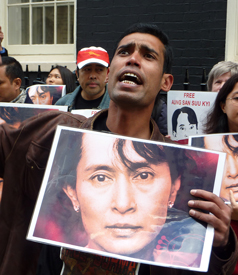Support justice-driven, accurate and transparent news — make a quick donation to Truthout today!
Military-ruled Burma (Myanmar) announced it will hold its first elections in 20 years this Nov. 7. But the road ahead is far from certain, as new political parties struggle to compete with junta-backed favorites.
Burma’s 1990 election was annulled by its military rulers after the opposition party of Aung San Suu Kyi won. She has since been under almost continuous house arrest and over the years the junta has resisted outside pressure for change and increased its grip over Burma’s economic and political life, taking its own path to what it calls a “discipline-flourishing democracy.”
Ms. Suu Kyi’s political party is boycotting the election, which it sees as flawed and unjust, though a breakaway group has formed to take part.
Critics in Burma say the elections will be a farce that perpetuates oppressive military rule. But others argue that a nominally civilian government is better than the current dysfunctional system and could produce modest change over time.
At least 40 parties have registered to compete for 330 seats in the national parliament. A further 110 seats are reserved for the military. Regional parliaments are also up for grabs in Burma’s 14 provinces, including ethnic minority areas where armed groups still operate.
The US and other Western governments have roundly criticized Burma’s election plans as undemocratic. They have pressed the junta to release all political prisoners, including Suu Kyi. Several countries impose economic and political sanctions on Burma over its human rights record.
But observers don’t expect any concessions from the junta before the election. In any event, Western influence in Burma is far weaker than that of neighboring countries like Thailand, China and India, which have invested far more in Burma’s resource-based economy.
The party favored to sweep the election is the junta-backed Union Solidarity and Development Party led by the current prime minister and other cabinet members. Other parties are believed to enjoy the regime’s patronage. A handful of parties have staked out an opposition agenda.
Whatever the makeup of the new parliament, the Army will continue to exert power from the sidelines. The 2008 constitution puts the military chief in control of security agencies and gives him the power to declare a state of emergency.
Media that fights fascism
Truthout is funded almost entirely by readers — that’s why we can speak truth to power and cut against the mainstream narrative. But independent journalists at Truthout face mounting political repression under Trump.
We rely on your support to survive McCarthyist censorship. Please make a tax-deductible one-time or monthly donation.
